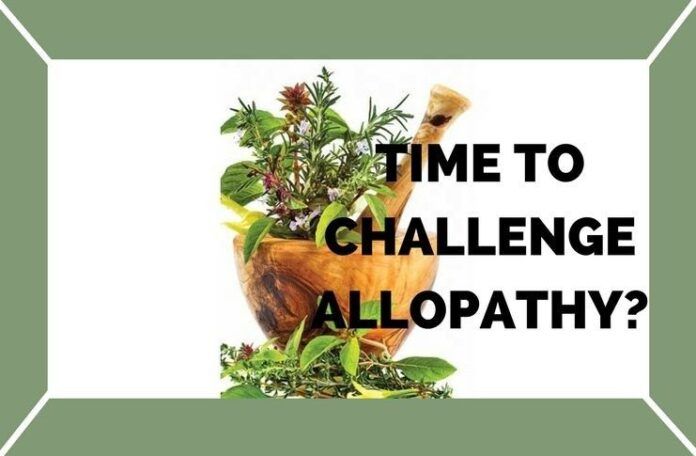
Allopathy has been becoming obscenely commercial
[dropcap color=”#008040″ boxed=”yes” boxed_radius=”8px” class=”” id=””]T[/dropcap]raditional Indian food, health and medicine have a long history, spanning over thousands of years. Every vegetable and cereal had a medical name, a list of benefits, recipes, and prescriptions of when to eat and when to avoid. Ayurveda and Siddha medicines are organic, mostly herbal.
Naturopathy dealt with natural ways of healing, with (vegetarian) food as medicine. Regardless of whether one agrees with Indian systems of food, health and medicine or not, they served people well for thousands of years, when the society was quite evolved in almost all walks of life.
Yoga was considered a physical-cum-mental exercise.
After the Islamic and British invasions, both of which were mostly destructive rather than inclusive, most of the knowledge in these systems was lost. Ultimately, the western empire was built on the foundations of ‘modern science’, which included allopathy as its medical science.
In recent decades, allopathy has been becoming obscenely commercial, making living difficult even in the rich countries, to the extent that it is one of the key topics on which the US Presidential Elections are fought.
Some well-meaning doctors from within the allopathic system have started questioning the very premises of allopathy as a hoax, a placebo at best, making false implied promise of ‘protection from death and deadly diseases’ but falling far short. They question the claims about many of the allopathic drugs and devices.
[dropcap color=”#008040″ boxed=”yes” boxed_radius=”8px” class=”” id=””]T[/dropcap]hey say MNC pharma companies have succeeded in marketing their products unethically to hospitals and medical professionals and eventually to people; these pharma companies manipulate clinical trial results, hide negatives, underplay side-effects, and sell their products at usurious profits.
Food is an accomplice industry, where wrong notions have been sown in the minds of people
Cancer and AIDS treatment are considered the biggest ‘cheat’ industries. These doctors say there is widespread fraud in allopathic treatment, informed consent, scans & investigations, false treatment post-death, suppression of alternatives, etc.
It is very costly to become a doctor, and so doctors are forced to recover their investment by fleecing their patients, by fair means and foul. There are some very good and humane doctors, though they are also mostly victims of the system.
Food is an accomplice industry, where wrong notions have been sown in the minds of people. For example, people have been weaned away from healthy fats, jaggery, crystal sea salt etc they were consuming previously and nudged towards unhealthy refined oils, sugar, table salt etc they consume now. Oats has become a staple food though it’s unfit for human use, whereas most of the healthy millets have disappeared. And doctors have done precious little to educate the people about these.
[dropcap color=”#008040″ boxed=”yes” boxed_radius=”8px” class=”” id=””]W[/dropcap]e can go on and on and on. But, suffice it to say that the time has come to question everything we have come to believe in food and medicine on the basis of ‘modern science’, and use the very same science to discover better alternatives.
Am I suggesting that we abandon allopathy and current food habits and change over to Indian systems? Not really. In any case, food and medicine are an individual choice, not to be dictated by the Government. Despite a very soft corner I have for Ayurveda and Siddha, I won’t go in for them for fear of the possible negatives like the suspected use of ‘heavy metals’ in these medicines, and the fact that they are not ‘scientifically proven yet’.
So, what am I suggesting?
Modern Science has given us a very useful tool to investigate every belief for its veracity; it’s called Research Methodology. It outlines a way to seek the truth in the material world.
Whenever we’re in doubt about a belief, whether it is in applied/ social science, we could propose a hypothesis and do research attempting to prove it. At the end of the research, either the hypothesis is accepted or rejected, scientifically. This research can be repeated under identical conditions by anyone, at anytime, anywhere, and the results should be the same. Replicability is an important aspect of this methodology. So, results in this method can’t be easily manipulated.
For example, we can use Research Methodology to find out if a certain medicine would cure a disease or not; if it would, who would (or would not) benefit from it; what are the possible outcomes and side-effects, etc. (In social science, for example, we can find out if reservation policy has benefitted a specific community, and if so what extent.)
[dropcap color=”#008040″ boxed=”yes” boxed_radius=”8px” class=”” id=””]O[/dropcap]ne of the reasons why health care costs have been zooming the world over is because of allopathy, as a system, has been monopolising the field of medicine, and pharma industry has grown into a huge uncontrolled cartel. If it has cost-effective challenges, competition will bring down its own costs substantially.
Indian systems (like Ayurveda, Siddha and Naturopathy) have not been formally put through the rigours of Research Methodology (Clinical Trials), and so their acceptability to the scientific community and the public at large is very limited. From the empirical and anecdotal information which they rely on, these systems won’t gain acceptability.
Clinical Trials is the way, but it will cost significant time and tonnes of money. Only in recent times, some efforts have started, but they are in such a low key that we can’t expect an affirmative nod or a firm rejection of the Indian systems of medicine in the near future.
At the speed with which our native systems are disappearing, we may not have specialists in them for long. We should quickly put our systems through rigorous clinical trials when we still have such specialists around. They can generate 1000s of hypotheses for proving, and after trials, even if only some of these are successful, we may hopefully have proven treatment alternatives from Indian systems for many ailments. And we could try to rediscover the ones that fail the trials through more research on our systems.
[dropcap color=”#008040″ boxed=”yes” boxed_radius=”8px” class=”” id=””]T[/dropcap]he Government should quickly convert our Government and private hospitals practising Indian systems of medicine into research centres, and encourage them with substantial financial support to do serious research to test the efficacy of our systems of medicine (and food habits).
Though the allopathic system has been accepted as almost the ‘de facto’ global standard of medicine if Indian systems can challenge them seriously and replace them at least partially, the economic benefit to India would be phenomenal. Since our systems are less costly, the cost of Medicare would also come down the world over.
Even if (by a rare chance), all the Indian medicines fail clinical trials, we would have settled the issue of their efficacy, once and for all.
Allopathy, in a manner of speaking, fights nature, while our systems go with nature. Yet there could be a place for allopathy when other systems don’t have a solution, say as a tertiary line of treatment. Surgery is one realm where there aren’t any obvious alternatives to allopathy, though Indian systems of medicine believe many of the surgeries are avoidable.
Note:
1. The views expressed here are those of the author and do not necessarily represent or reflect the views of PGurus.
- How BJP can get 33%+ vote share in TN - April 1, 2024
- A transparent, equitable electoral funding alternative - March 19, 2024
- How TN BJP can come to No. 1 or No. 2 in 2024 LS polls - January 11, 2024











Dear Mr. Ganeshan,
Your article emphasises on an important aspect “clinical trial”. But this might not work with Ayurveda, simply because unlike allopathy, ayurveda is more individualistic and not an en-mass kind of system. What I mean is one patient’s body nature can be and most likely it will be very different from another’s. A person may be having prameha (diabetes ) due to Vaata and another one may be having it due to kapha. So line of treatment is different. It is not very easy to find a group of people withe same body nature( eg. like Vaata, pitta, kapha or combination of those) and hence the challenge for clinical trials and hypothesis etc…
Dear Author,
While the intention the article seems right but it is not put on strong foundation of knowledge of Indian System of Medicines and understanding of Economics and games in general Or there is an intentional push for something evil here?
While accepting in the initial paragraphs that the lobbying and malpractices promoted by the capitalist motives of the west what are we trying to achieve seeking clinical trials. What basis does your faith makes you believe that what money power by using money as tool to blind people of all faiths has done to the societies cannot blind the clinical trials? Are you underestimating the oligarchs or you have faith in the system acts in faith of human race? That we have in powers non corrupt people who work only towards the service of humanity? Must be some dream.
Not that the ISM cannot stand the competition but it is not an apple to apple compare at first place and the scale used is a heavily inclined or setup by the lobbyist and might only do harm by enforcing rules to restrict the oppressed further.
As long as the open market prevails and people have choice to select the pathology of their choice it should continue. Such open wrestling will only confuse the innocent humans further and the race as whole will again fall prey to capitalist profit motives.
It is funny to see the western riches coming to India for treatment cost and belief in indian system providing organic benefits and here the debate is on in Indians to agree on whether their ancestors were right or wrong? If it is left to be an open market visit an authentic treatment center and follow the pathology for yourself and you shall confirm the difference as a unbiased consumer.
When it comes to the question of fake practitioners they are in all pathologies aren’t they?
Myself student of economics and follower of Ayurveda since past 25 yrs. Not a single allopathy medicine or vaccine including fractures and deep incisions by accidents. Be it wealth or health just that you do not follow the herd blindly and do not fall prey to marketing gimmicks and you shall be safe.
Hope your next articles have a basis of personal research and experience or do not expect people to read more. Writing on public forums is an responsibility and much like political motives marketing is also biased to certain class of the society and the root cause of the imbalance and inequality the world around us is experiencing.
Best of luck for your next write-up.
Dear Mr. Manish,
Let me give 3 samples of literature to reiterate my points, which are self explanatory:
1. https://www.hindujagruti.org/hinduism/global-market-position-ayurvedic-products
I quote from this:
“Total global herbal market is of size 62.0 billion dollars, in this India’s contribution is only one billion dollars. It is authentically explained that the position of India in the global market is very very poor.”
“While there is extensive literature going back 2500 years to Charka Samhita (Al-Qanoon for unani) mentioning practices and cures, a deficiency of the ISM is that objective data through clinical trials and laboratory work has not been generated to prove the extent of efficacy of individual prescriptions and cures. As a result, the practitioners leading to varying results prescribe a large variety of cures and practices. It will be beneficial if the cures mentioned in the texts are systematically taken up and subjected to laboratory investigation and clinical trials so that their efficacy is established or disproved.”
2. http://cii.in/WebCMS/Upload/Mr%20T%20Balakrishnan.pdf
3. http://timesofindia.indiatimes.com/india/90-of-Indians-prefer-allopathy-over-AYUSH/articleshow/47981441.cms
I think this article articulates confusion in the minds of an Indian who is aware of Ayurveda but afraid to try it fully.He has also highlighted the unscientific way current practitioners of Ayurveda are going about their business.Ayurveda will survive but has the danger of fully going into the hands of crooks masquerading as vaidyars.My suggestion is simple.There are still well known honest knowledgeable ayurvedic doctors.Why not pGurus give space for people to add names of doctors they know who are reliable? Peer review will quickly weed out crooks from genuine.I will suggest a name who i know is a very good knowledgeable committed ayurvedic doctor.His name is Radhakrishna Sastri in Trichy.If he is still alive, he will be in the 90s.He is a treasure.
Dr Radhakrishna Sastry is no more. Please read more about him at:
http://svradhakrishnasastri.in/about-us/
Many thanks.Sad he passed away but sadder still he was alive till 2014, I could have met him.Anyway, not destined to have that privilege.You made my day.Lots to read,lots to learn.Thank you once again
Start with patenting all natural processes. Otherwise once you start proving them in trials the west will patent them or appropriate them without recognizing their source.
I agree; this is priority. But I don’t know if they are patentable, perhaps GIs, maybe?
Necessity is the mother of invention. If medical treatments are getting costlier and BP,diabetes.coronary diseases,cancer are on the rise it would force people to slowly change their lifestyle as well as food practices.
Indian medical systems traditionally are preventive in nature and inculcate certail medicinal value as strict regimen part of daily routine. Soon people would realize them/rediscover and move towards them.
On a side note,
One thing Indians adhered to/believed sincerely in the past was to emulate role models in society who show to them before their own eyes how to live healthily. But unfortunately today such role models without controversies are rare to find these days and most are misused by politicians thereby creatin bad name.to this model
First, Ayurveda and siddha work on completely different parameters. Unlike allopathy, where treatment is done symptomatically, Ayurveda and siddha is based on balancing tridosha, namely vata, pitta and kapha. If at all clinical trials must be done, it must be done on the basis of tridosha. Nonsense like b.p., diabetes ( as a stand alone condition) CANNOT be fit into the ayurvedic system. I’m a heart patient(??) according to allopathy, i walked out of hospital providing allopathic treatment thrice, when the doctors there said i might collapse and die at anytime if I’m not admitted in the icu but all that was required was warm water taken every half an hour to bring down the vata…i could go on but don’t have the patience to write…